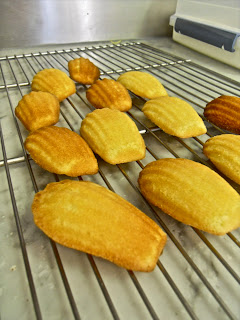Another week, another topic. This time we have turned our hands to some classic, basic cakes and the theory that goes along with it. Current theory hot topics are aeration methods closely followed by cake mixing methods. For those of you not privaledged enough to be fed this information in school, the three menthods of aeration are chemical, natural and mechanical. Heres a quick break down. Chemical aeration uses products such as baking powder to create the rise in the cake. This is what is most commonly used in home cooking and what I have relied on for many years. Natural aeration is what we saw last week with the breads where a cheeky bit of yeast is used to give the lift. And finally, most painfully, is mechanical aeration. Opposed to what the name suggests this is pure man power. The batter is aerated by hand - whisk till you can't whisk no more.
Thankfully lesson one on cakes we stuck to the tried and trusted chemical aeration and only had to endure the minor pains of creaming butter into a frenzy. In demo the chef taught us four such cakes. A fruit cake, lemon cake, almond and pistachio and some lovely little madelines. Anyway, enough chat from me, here are the pictures your waiting for.
Chefs mirrored plate of delight
Madelines, described aptly by a coursemate as 'baked love'
This week we were out of demo and straight into the kitchen to make our lemon cake and madelines. It was our first, and eagerly anticipated, lesson with the head of patisserie so we creamed and zested till our hearts content and hoped for the best. Feedback this week was really good and detailed, by which i mean chef literally tore our cakes to pieces to show us where we went right/wrong. The more specific you can get your feedback the better, for example chef said my madelines were good but would have been better if they were slightly less whisked - perhaps just a minute too much. Madelines are definatley something I dont mind perfecting at home, they are cute, bite-size, tasty and (with a few tricks) relatively easy to make - whats not to love?






No comments:
Post a Comment